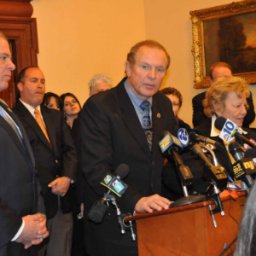Amended Bill Now Heads to Assembly for Consideration
TRENTON – A bill sponsored by Senators Raymond Lesniak and Jeff Van Drew which would replace the failed Council on Affordable Housing (COAH) with common sense, achievable affordable housing regulations was approved by the Senate today by a vote of 28-3.
“New Jersey is not living up to its affordable housing responsibility,” said Senator Lesniak, D-Union, and chairman of the Senate Economic Growth Committee. “COAH has been an abject failure, and as a result, municipal officials have been saddled with unattainable, unrealistic mandates for housing, and little affordable housing has been built. This bill creates a fairer standard, and will result in more housing with less bureaucracy.”
“For years, New Jersey’s efforts to provide affordable housing for its residents have been a dismal failure,” said Senator Van Drew, D-Cape May, Cumberland and Atlantic, and chair of the Senate Community and Urban Affairs Committee. “As a result, we have a serious affordable housing shortage, and people simply cannot afford to live where they work. This bill would expand our affordable housing stock and make sure we’re creating real housing opportunities.”
The bill, S-1, would abolish the Council on Affordable Housing and replace it with a two-pronged approach to creating housing opportunities. The first part would require that 10 percent of all residential units built in a development project of five or more units be reserved for low- and moderate-income families, and five percent of residential development projects with less than five units be reserved. Under the bill, half of the reserved units would be set aside for low-income housing, for families whose income is equal to or less than 50 percent of the median gross household income within the region, and half would be set aside for median income families, who make between 50 and 80 percent of the median gross household income within the region. For the purposes of meeting the set-aside requirements, one special needs unit would count as two units towards the affordable housing requirement on a development.
Under the bill, municipalities would be able to reserve half of the low- and moderate-income units for families in which one member works or resides in the municipality. Municipalities would be required to make a reasonable effort to facilitate the economic viability of inclusionary developments, and developers would be permitted to satisfy their affordable housing requirements through alternate means, including off-site construction or rehabilitation of existing units, a development fee of 2.5 percent of the equalized, assessed value of the project to the municipality’s affordable housing trust fund, or the purchase or subsidization of units that are subsequently sold or rented to low- and moderate-income families.
“By engaging municipalities and developers to work together to create economically-viable affordable housing, we can see real results without the pie-in-the-sky housing projections from bureaucrats in Trenton,” said Senator Van Drew. “In the twenty-five-year history of COAH, the agency has produced far fewer housing units through its micro-managing mandates than it otherwise could have. By bringing a market-driven approach to affordable housing, we can ensure that we’re producing actual, livable units, and not just paper mandates.”
The second part of the bill would establish inclusionary zoning standards for municipalities in order to foster greater affordable housing development. Under the bill, a municipality would be deemed inclusionary if it has at least 7.5 percent of its overall housing stock in the form of price-restricted units, or if 33 percent of the overall housing stock is in the form of multiple dwellings, townhouses, other attached units or mobile homes. The bill requires half of these attached units to be rental units, and the Department of Community Affairs (DCA) would have the authority to exclude luxury units from the inclusionary calculations.
If a municipality doesn’t already meet the inclusionary standards in the bill for existing development, it would still be able to meet the inclusionary requirements by adopting an ordinance that zones at least 20 percent of its developable land for workforce housing, which would be available to families making less than 120 percent of the median gross household income within the region. Barring an inclusionary determination by DCA, either through existing units or new zoning rules, municipalities would be required to consider any affordable housing development applying for a d-variance as “inherently beneficial,” thereby granting zoning relief so long as the unit is shown not to be a substantial detriment to the public good.
“The inclusionary standards in the bill recognize that New Jersey’s municipalities still have a responsibility to create housing opportunities for everyone, not just the economically well-off,” said Senator Lesniak. “By complying with the inclusionary standards or the d-variance alternative, municipalities will meet the mandate established by the Mount Laurel decisions without COAH’s unwieldy, and ultimately, unproductive mandates. At the same time, we’ll be able to create new housing opportunities for a segment of the population that is often overlooked under the current system – the working class families who still cannot afford a place to live in New Jersey.”
Finally, the bill provides that any funds collected in municipal affordable trust funds that are not committed to projects within two years would escheat to the State Affordable Housing Trust Fund. Funds escheated to the State from an inclusionary municipality would be used in the county of origin, while funds from a municipality which has not met the inclusionary standards would be used for projects within that municipality. Municipalities would be prohibited from imposing any affordable housing feeds on non-residential property or construction.
“This bill will produce affordable housing and jobs, without the job-killing fees and mandates imposed under the old system,” said Senator Lesniak. “We have to take a global view of affordable housing in New Jersey, and its impact on the economic well-being of the State. The mandates and fees imposed under COAH have choked out any possibility of development and redevelopment in our communities, and this bill is intended to break the logjam, create housing opportunities and put people back to work.”
The bill now heads to the Assembly for consideration, before going to the Governor to be signed into law.






